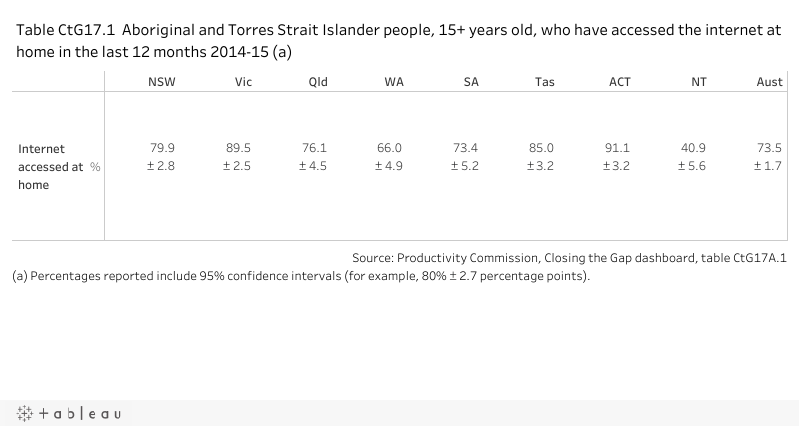Target 17
By 2026, Aboriginal and Torres Strait Islander people have equal levels of digital inclusion.
Nationally in 2014-15, 73.5% of Aboriginal and Torres Strait Islander people aged 15 years and over accessed the internet in their home (table CtG17.1).
There is no comparable data on home access to the internet for non-Indigenous people. This means that estimating a trajectory to achieve parity is not currently possible.
There is no new data since the baseline year of 2014-15. Please refer to the How to interpret the data page for more information.

Target data specifications
Outcome: | Aboriginal and Torres Strait Islander people have access to information and services enabling participation in informed decision-making regarding their own lives. |
|---|---|
Target: | By 2026, Aboriginal and Torres Strait Islander people have equal levels of digital inclusion. Comparable data on non-Indigenous people are currently not available. This means that there is currently no target or indicative trajectory to achieve parity. |
Indicator: | Proportion of Aboriginal and Torres Strait Islander people aged 15 years or over who have accessed the internet at home in the last 12 months. |
Measure: | The measure is defined as: Numerator — number of Aboriginal and Torres Strait Islander people aged 15 years and over who have accessed the internet at home in the last 12 months Denominator — total number of Aboriginal and Torres Strait Islander people in the population aged 15 years or over and is presented as a percentage. |
Target established: | National Agreement on Closing the Gap April 2021 |
Latest dashboard update: | 23 June 2021 |
Indicator type: | Target |
Interpretation of change: | A high or increasing proportion is desirable. An increase from the baseline year is an improvement. |
Data source(s): | Name: ABS National Aboriginal and Torres Strait Islander Social Survey (NATSISS) Frequency: Periodic |
Data provider: | Provider name: Australian Bureau of Statistics Provider area: Centre for Aboriginal and Torres Strait Islander Statistics |
Baseline year: | 2014-15 |
Target year: | 2026 |
Disaggregations: | State and territory and Australia. |
Computation: | Numerator divided by Denominator multiplied by 100 Counting rules Data are for all Aboriginal and Torres Strait Islander people who were usual residents of private dwellings in Australia. Geographical variables are based on the location of the household. Includes (numerator):
Excludes (numerator):
Supporting calculations
See the How to interpret data page for further information. Extraction TableBuilder – Age group – 15 years and over (Person level) X State or Territory (Household level) X Whether accessed internet at home in last 12 months (Person level) |
Data quality considerations: | See NATSISS explanatory notes for further information: https://www.abs.gov.au/ ausstats/abs@.nsf/Latestproducts/4714.0Explanatory%20Notes12014-15?opendocument&tabname=Notes&prodno=4714.0&issue=2014-15 Data values have been randomly adjusted using perturbation to avoid the release of confidential data. Discrepancies may occur between sums of the component items and totals. Estimates that have a relative standard error between 25% and 50% should be used with caution. Estimates with a relative standard error of 50% or more are considered too unreliable for general use. |
Future reporting: | Additional disaggregations required for future reporting:
|
Supporting indicators
Driver
- Levels of digital inclusion among Aboriginal and Torres Strait Islander people as compared with other Australians
Disaggregated by access, affordability and digital ability
- Proportion of Aboriginal and Torres Strait Islander households accessing the internet
- Proportion of Aboriginal and Torres Strait Islander people accessing the internet
Disaggregated by point of access: home, work, school, public access, government shopfront
- Frequency of internet access at home in last 12 months
Daily, weekly, monthly, yearly
- Proportion of Aboriginal and Torres Strait Islander people using internet to access government services for private purposes
For example, health services, taxation, bill payments, social security payments
- Number of Aboriginal and Torres Strait Islander people employed in media
Disaggregated by income levels
Contextual information
- Number and location of community broadcast licenses with an Indigenous interest
- Number and location of broadcast transmitters
Material for download
- People have access to information and services enabling participation in informed decision-making regarding their own lives data tables (XLSX - 40 Kb)
- People have access to information and services enabling participation in informed decision-making regarding their own lives dataset (CSV - 51 Kb)
To assist with interpretation of the data provided (Excel data tables and CSV dataset) please refer to the target data specification above.
